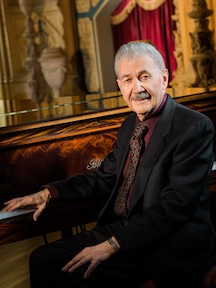By Alexis Sargent
David DiChiera (ΦBK, UCLA) had a profound impact in the international opera scene, especially in the community of Detroit, Michigan.
DiChiera advocated for the arts and was adamant that the overall health of a city was intrinsically related to its artistic production and activity. DiChiera also believed that it was important for a metropolitan community to have its arts centered in its city. This was why he wanted Michigan to have an opera theatre in the heart of Detroit.
He had an extraordinary vision for the dilapidated 3,500-seat Grand Circus Theatre, a former movie palace in Detroit. DiChiera thought the building could be made into an opera house for the enrichment of the state of Michigan.
The restoration of the building into an opera theatre spurred economic development for the neighborhood surrounding it sparking a reniassance. Many recent projects, such as downtown major league stadiums, restaurants, apartments, and businesses, were made possible because of DiChiera’s pioneering creation of the Michigan Opera Theatre in the heart of the city.
The Michigan Opera Theatre (MOT) has historically been at the forefront of nurturing the careers of leading African-American opera artists. DiChiera was recognized both locally and nationally for these efforts. He provided budding artists of color— including singers Kathleen Battle and Carmen Balthrop, conductor Willie Waters, stage director Tazwell Thompson—with key career opportunities.
President and CEO Wayne S. Brown of the Michigan Opera Theatre spoke of the commitment DiChiera and the Michigan Opera Theatre have had to diversity in their artistic ventures:
“DiChiera was a firm believer that opera should be accessible and reflective of modern and diverse experiences, especially in Detroit, a city with a population that is predominantly African American,” said Brown. “He believed MOT should present works reflective of its local community and also provide opportunities for people of color to see themselves represented on stage.”
The United States’ highest award for lifetime achievement in opera, The Opera Honors Award from the National Endowment for the Arts, was presented to DiChiera in October 2010.
In addition to his efforts to ensure access to opera, DiChiera was an advocate for arts education. Lisa, DiChiera’s daughter, voiced that her father worked to inspire in others a love of learning by supporting early education and arts programs in the metro Detroit school systems:
“My father was a large proponent of arts education and funding for school arts programs,” said Lisa. “He believed that being able to learn music and art in schools was a fundamental way to ensure a well-rounded education for children.”
Brown spoke to the kindness, caring persona, and way of inspiring others that DiChiera embodied.
“David DiChiera’s legacy spans many areas ranging from opera to the city of Detroit to the individual impact he left on every person he met. He was passionate about making opera more accessible and diverse, taking the lead on color-blind casting, and presenting works that reflected a variety of cultural experiences,” Brown said. “He also championed the commissioning of new operas, encouraging the next generation of composers and singers.”
Through his service to Detroit and the opera community, DiChiera represented Phi Beta Kappa’s values of supporting learning and advancing the arts during his lifetime. He passed away at the age of 83 on September 18, 2018. DiChiera is remembered as a visionary and a beloved figure throughout the international opera world.
Alexis Sargent is a senior at Michigan State University studying social and public policy. Michigan State University is home to the Epsilon of Michigan chapter of Phi Beta Kappa.




